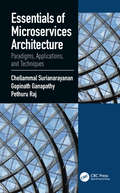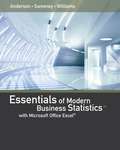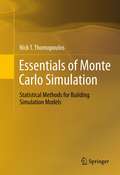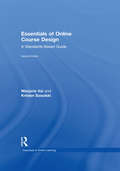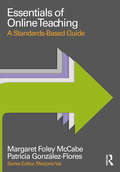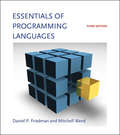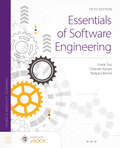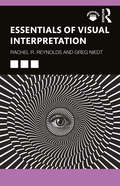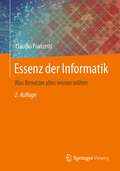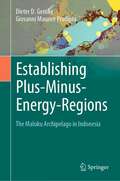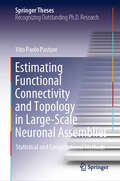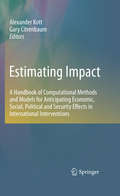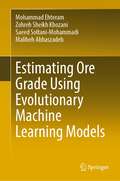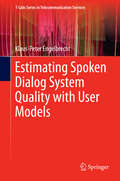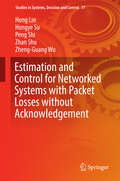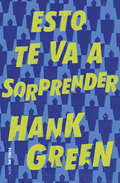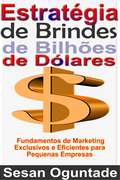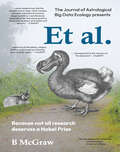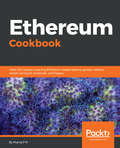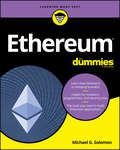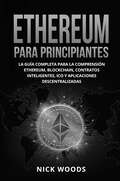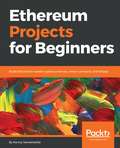- Table View
- List View
Essentials of Microservices Architecture: Paradigms, Applications, and Techniques
by Chellammal Surianarayanan Gopinath Ganapathy Raj PethuruMicroservices architecture (MSA) is increasingly popular with software architects and engineers as it accelerates software solution design, development, and deployment in a risk-free manner. Placing a software system into a production environment is elegantly simplified and sped up with the use of MSA development platforms, runtime environments, acceleration engines, design patterns, integrated frameworks, and related tools. The MSA ecosystem is expanding with third-party products that automate as many tasks as possible. MSA is being positioned as the enterprise-grade and agile-application design method. This book covers in-depth the features and facilities that make up the MSA ecosystem. Beginning with an overview of Service-Oriented Architecture (SOA) that covers the Common Object Request Broker Architecture (CORBA), Distributed Component Object Model (DCOM), and Remote Method Invocation (RMI), the book explains the basic essentials of MSA and the continuous delivery of applications to customers. The book gives software developers insight into: Current and emerging communication models Key architectural elements of MSA-based applications Designing efficient APIs for microservices MSA middleware platforms such as REST, SOAP, Apache Thrift, and gRPC Microservice discovery and the API gateway Service orchestration and choreography for composing individual services to achieve a useful business process Database transactions in MSA-centric applications Design, composition, security, and deployment patterns MSA security Modernizing legacy applications The book concludes with a chapter on composing and building powerful microservices. With the exponential growth of IoT devices, microservices are being developed and deployed on resource-constrained but resource-intensive devices in order to provide people-centric applications. The book discusses the challenges of these applications. Finally, the book looks at the role of microservices in smart environments and upcoming trends including ubiquitous yet disappearing microservices.
Essentials of Modern Business Statistics with Microsoft Office Excel® 6th edition
by David R. Anderson Dennis J. Sweeney Thomas A. WilliamsFrom the renowned author team that has been writing market-leading business statistics textbooks for more than 20 years, ESSENTIALS OF MODERN BUSINESS STATISTICS, 6TH EDITION provides a brief introduction to business statistics. The text balances a conceptual understanding of statistics with the real-world application of statistical methodology using problem-scenarios and real-life examples. Step-by-step instructions and screen captures demonstrate how to most effectively use the latest version of Excel in statistical procedures, while numerous exercises give readers hands-on experience putting what they learn into practice. The Sixth Edition is packed with all-new Case Problems, Statistics in Practice applications, and real data examples and exercises.
Essentials of Monte Carlo Simulation
by Nick T. ThomopoulosEssentials of Monte Carlo Simulation focuses on the fundamentals of Monte Carlo methods using basic computer simulation techniques. The theories presented in this text deal with systems that are too complex to solve analytically. As a result, readers are given a system of interest and constructs using computer code, as well as algorithmic models to emulate how the system works internally. After the models are run several times, in a random sample way, the data for each output variable(s) of interest is analyzed by ordinary statistical methods. This book features 11 comprehensive chapters, and discusses such key topics as random number generators, multivariate random variates, and continuous random variates. Over 100 numerical examples are presented as part of the appendix to illustrate useful real world applications. The text also contains an easy to read presentation with minimal use of difficult mathematical concepts. Very little has been published in the area of computer Monte Carlo simulation methods, and this book will appeal to students and researchers in the fields of Mathematics and Statistics.
Essentials of Online Course Design: A Standards-Based Guide (Essentials of Online Learning)
by Marjorie Vai Kristen SosulskiIn spite of the proliferation of online learning, creating online courses can still evoke a good deal of frustration, negativity, and wariness in those who need to create them. The second edition of Essentials of Online Course Design takes a fresh, thoughtfully designed, step-by-step approach to online course development. At its core is a set of standards that are based on best practices in the field of online learning and teaching. Pedagogical, organizational, and visual design principles are presented and modeled throughout the book, and users will quickly learn from the guide’s hands-on approach. The course design process begins with the elements of a classroom syllabus which, after a series of guided steps, easily evolve into an online course outline. The guide’s key features include: a practical approach informed by theory clean interior design that offers straightforward guidance from page one clear and jargon-free language examples, screenshots, and illustrations to clarify and support the text a checklist of online course design standards that readers can use to self-evaluate. a Companion Website with examples, adaptable templates, interactive learning features, and online resources: http://essentialsofonlinecoursedesign.com Essentials of Online Course Design serves as a best practice model for designing online courses. After reading this book, readers will find that preparing for online teaching is a satisfying and engaging experience. The core issue is simply good design: pedagogical, organizational, and visual. For more of Marjorie Vai in her own words, listen to this 2011 interview from the On Teaching Online podcast: http://onteachingonline.com/oto-16-essentials-of-online-course-design-with-marjorie-vai/
Essentials of Online Teaching: A Standards-Based Guide (Essentials of Online Learning)
by Margaret Foley McCabe Patricia González-FloresTeachers’ active online participation and engagement with students are critical factors to the success of online courses. Essentials of Online Teaching is a standards-based, straightforward guide to teaching online in higher education, high school and vocational training, or corporate learning environments. This brief but powerful book encourages immediate application of concepts with the help of real-world examples, technical insights, and professional advice. The guide includes: a practical approach informed by, but not about, relevant learning theories; clear models and examples from a wide variety of online courses; teachers’ reflections about their online practice; a checklist of standards to help guide teaching decisions; and an accompanying website (www.essentialsofonlineteaching.com) with additional resources. Essentials of Online Teaching addresses key instructional challenges in online teaching and presents the reader with practical solutions for each phase of a course—preparation, beginning, middle, and end.
Essentials of Pattern Recognition: An Accessible Approach
by Jianxin WuThis textbook introduces fundamental concepts, major models, and popular applications of pattern recognition for a one-semester undergraduate course. To ensure student understanding, the text focuses on a relatively small number of core concepts with an abundance of illustrations and examples. Concepts are reinforced with hands-on exercises to nurture the student's skill in problem solving. New concepts and algorithms are framed by real-world context and established as part of the big picture introduced in an early chapter. A problem-solving strategy is employed in several chapters to equip students with an approach for new problems in pattern recognition. This text also points out common errors that a new player in pattern recognition may encounter, and fosters the ability for readers to find useful resources and independently solve a new pattern recognition task through various working examples. Students with an undergraduate understanding of mathematical analysis, linear algebra, and probability will be well prepared to master the concepts and mathematical analysis presented here.
Essentials of Programming Languages, third edition (The\mit Press Ser.)
by Daniel P. Friedman Mitchell WandA new edition of a textbook that provides students with a deep, working understanding of the essential concepts of programming languages, completely revised, with significant new material.This book provides students with a deep, working understanding of the essential concepts of programming languages. Most of these essentials relate to the semantics, or meaning, of program elements, and the text uses interpreters (short programs that directly analyze an abstract representation of the program text) to express the semantics of many essential language elements in a way that is both clear and executable. The approach is both analytical and hands-on. The book provides views of programming languages using widely varying levels of abstraction, maintaining a clear connection between the high-level and low-level views. Exercises are a vital part of the text and are scattered throughout; the text explains the key concepts, and the exercises explore alternative designs and other issues. The complete Scheme code for all the interpreters and analyzers in the book can be found online through The MIT Press web site. For this new edition, each chapter has been revised and many new exercises have been added. Significant additions have been made to the text, including completely new chapters on modules and continuation-passing style. Essentials of Programming Languages can be used for both graduate and undergraduate courses, and for continuing education courses for programmers.
Essentials of Programming in Mathematica®
by Paul WellinEssentials of Programming in Mathematica® provides an introduction suitable for readers with little or no background in the language as well as for those with some experience using programs such as C, Java, or Perl. The author, an established authority on Mathematica® programming, has written an example-driven text that covers the language from first principles, as well as including material from natural language processing, bioinformatics, graphs and networks, signal analysis, geometry, computer science, and many other applied areas. The book is appropriate for self-study or as a text for a course in programming in computational science. Readers will benefit from the author's tips, which provide insight and suggestions on small and large points. He also provides more than 350 exercises from novice through to advanced level with all of the solutions available online.
Essentials of Software Engineering
by Frank Tsui Orlando Karam Barbara BernalWritten for the undergraduate, 1-term course, Essentials of Software Engineering provides students with a systematic engineering approach to software engineering principles and methodologies. Comprehensive yet concise, the new edition covers some of the latest improvements in technology and tools, while reducing areas that are becoming less relevant. In-depth coverage of key issues, combined with a strong focus on software quality, makes Essentials of Software Engineering the perfect text for students entering the fast-growing and lucrative field of software development. The text includes thorough overviews of programming concepts, system analysis and design, principles of software engineering, development and support processes, methodologies, software testing, quality assurance, and product management, while incorporating real-world examples throughout. Presents a broad coverage of the software engineering field that lends itself well to an introductory course. Clearly differentiates and explains software engineering from the subtopics of software processes, software development, and software management. Expanded coverage of continuous integration and Agile methodologies. New coverage of contemporary design and development ideas, including SOA, microservices, virtualization, and containerization. © 2023 | 332 pages
Essentials of Visual Interpretation
by Greg Niedt Rachel R ReynoldsEssentials of Visual Interpretation explains how to talk and write critically about visual media and to examine how evolving visual environments, media, and technologies affect human selfunderstanding and culture formation.Lively and accessibly written chapters provide a solid foundation in the tools and ideas of visual meaning, familiarizing readers with a growing, cross-cultural subfield, and preparing them to pursue thoughtful work in a variety of related disciplines. The authors include rich examples and illustrations—ranging from cave paintings to memes, from optical science to visual analytics, from ancient pictographs to smart phones—that engage students with the fascinating complexity of visual interpretation. Each chapter introduces students to key terms and concepts relevant to visual analysis, with ideas for short individual or group exercises to enhance understanding.The book is ideal as a primer in visual analysis and visual communication for students in courses within communication studies, cultural studies, digital humanities, semiotics, media studies, and visual anthropology.Online support materials include multimedia activities for students and links to additional resources for students and instructors.
Essenz der Informatik: Was Benutzer alles wissen sollten
by Claudio FranzettiDiese erweiterte 2. Auflage richtet sich an die regelmäßigen Benutzer von IT, also Berufstätige sowie Schüler, Studierende und Lehrer. Das Buch beschreibt das relevante Universum der Informatik und der Informationstechnologie, von den grundlegenden Prinzipien bis zur sozialen und gesellschaftspolitischen Bedeutung.Neu und erweitert sind u. a. Themen zu virtuellen Welten, zum Metaversum, zu digitalen Zwillingen sowie zu Aspekten von Verwaltung und Digitalisierung. Anhand zahlreicher Beispiele sowie Illustrationen und Grafiken wird die relevante IT-Umgebung der modernen Nichtfachperson dargestellt. Büroapplikationen, soziale Medien, Spiele und Hardwaretrends sowie die verwendeten Devices werden erklärt und in Zusammenhang gebracht.In einem Kapitel werden die ersten Grundlagen zur Programmierung der sehr populären Blocksprache Scratch gelegt. Zu jedem Kapitel werden zehn Fragen zum Inhalt gestellt, um dem Leser oder der Leserin eine Stütze zum gelesenen Inhalt zu geben und die Kompetenzen zu erweitern.Der InhaltGanz kurze Geschichte der ITAlles ist ZahlComputer als HardwareBetriebssystem und BenutzeroberflächeNetzwerkeDatenorganisationIT-EntwicklungIT-OrganisationProgrammierungApplikationenCloud-ComputingSicherheitInformation und MedienKünstliche IntelligenzVirtuelle WeltenIT, Digitalisierung und Gesellschaft
Establishing Plus-Minus-Energy-Regions: The Maluku Archipelago in Indonesia
by Dieter D. Genske Giovanni Maurice PradiptaThis book explains and illustrates how Indonesia as the largest and most populous country in Southeast Asia can become independent of fossil fuels by both reducing its energy needs and using renewable resources. A study presented in this work focuses on the Maluku Archipelago in eastern Indonesia with Ambon as its capital. Conventional energy is brought to the islands over long distances by partly simple means as boats, ships and aircrafts. This unsustainable situation calls for a decentralized renewable energy supply strategy. Based on the research presented in this book, it is clear that the archipelago has the potential to become a so-called plus-minus region. Plus-minus regions are regions that produce more renewable energy than they need and capture more CO2 than they emit. The authors are convinced that the presented strategy illustrated on the Maluku Archipelago can be transferred to other regions of the world and that only by developing plus-minus regions the international 2°C climate goal can be achieved. The model region thus serves as proof that the plus-minus target can also be achieved in emerging countries with limited financial resources.
Estimating Functional Connectivity and Topology in Large-Scale Neuronal Assemblies: Statistical and Computational Methods (Springer Theses)
by Vito Paolo PastoreThis book describes a set of novel statistical algorithms designed to infer functional connectivity of large-scale neural assemblies. The algorithms are developed with the aim of maximizing computational accuracy and efficiency, while faithfully reconstructing both the inhibitory and excitatory functional links. The book reports on statistical methods to compute the most significant functional connectivity graph, and shows how to use graph theory to extract the topological features of the computed network. A particular feature is that the methods used and extended at the purpose of this work are reported in a fairly completed, yet concise manner, together with the necessary mathematical fundamentals and explanations to understand their application. Furthermore, all these methods have been embedded in the user-friendly open source software named SpiCoDyn, which is also introduced here. All in all, this book provides researchers and graduate students in bioengineering, neurophysiology and computer science, with a set of simplified and reduced models for studying functional connectivity in in silico biological neuronal networks, thus overcoming the complexity of brain circuits.
Estimating Impact
by Alexander Kott Gary CitrenbaumVirtually all human endeavors can be analyzed and modeled and understood through computer-aided study, and that is very much at the core of operations research, game theory, and decision science. Understanding the potential impact of any action is critical to the success of that action, and in ESTIMATING IMPACT Alexander Kott and Gary Citrenbaum, with a stellar group of contributors, demonstrate how military or humanitarian interventions (or the decision not to intervene) can be rigorously analyzed beforehand and their likely impacts and ramifications predicted at levels appropriate to their scope. A wide range of modeling programs are available that support plan assessment and impact forecast, and they allow accurate prediction within an interdependent set of political, military, economic, social, information, and infrastructure systems, and experts involved in the use and development of these tools demonstrate how, when, and why they should be used.
Estimating Ore Grade Using Evolutionary Machine Learning Models
by Mohammad Ehteram Zohreh Sheikh Khozani Saeed Soltani-Mohammadi Maliheh AbbaszadehThis book examines the abilities of new machine learning models for predicting ore grade in mining engineering. A variety of case studies are examined in this book. A motivation for preparing this book was the absence of robust models for estimating ore grade. Models of current books can also be used for the different sciences because they have high capabilities for estimating different variables. Mining engineers can use the book to determine the ore grade accurately. This book helps identify mineral-rich regions for exploration and exploitation. Exploration costs can be decreased by using the models in the current book. In this book, the author discusses the new concepts in mining engineering, such as uncertainty in ore grade modeling. Ensemble models are presented in this book to estimate ore grade. In the book, readers learn how to construct advanced machine learning models for estimating ore grade. The authors of this book present advanced and hybrid models used to estimate ore grade instead of the classic methods such as kriging. The current book can be used as a comprehensive handbook for estimating ore grades. Industrial managers and modelers can use the models of the current books. Each level of ore grade modeling is explained in the book. In this book, advanced optimizers are presented to train machine learning models. Therefore, the book can also be used by modelers in other fields. The main motivation of this book is to address previous shortcomings in the modeling process of ore grades. The scope of this book includes mining engineering, soft computing models, and artificial intelligence.
Estimating Spoken Dialog System Quality with User Models
by Klaus-Peter EngelbrechtSpoken dialog systems have the potential to offer highly intuitive user interfaces, as they allow systems to be controlled using natural language. However, the complexity inherent in natural language dialogs means that careful testing of the system must be carried out from the very beginning of the design process. This book examines how user models can be used to support such early evaluations in two ways: by running simulations of dialogs, and by estimating the quality judgments of users. First, a design environment supporting the creation of dialog flows, the simulation of dialogs, and the analysis of the simulated data is proposed. How the quality of user simulations may be quantified with respect to their suitability for both formative and summative evaluation is then discussed. The remainder of the book is dedicated to the problem of predicting quality judgments of users based on interaction data. New modeling approaches are presented, which process the dialogs as sequences, and which allow knowledge about the judgment behavior of users to be incorporated into predictions. All proposed methods are validated with example evaluation studies.
Estimation and Control for Networked Systems with Packet Losses without Acknowledgement
by Peng Shi Hong Lin Hongye Su Zhan Shu Zheng-Guang WuThis book discusses recent advances in the estimation and control of networked systems with unacknowledged packet losses: systems usually known as user-datagram-protocol-like. It presents both the optimal and sub-optimal solutions in the form of algorithms, which are designed to be implemented easily by computer routines. It also provides MATLAB(r) routines for the key algorithms. It shows how these methods and algorithms can solve estimation and control problems effectively, and identifies potential research directions and ideas to help readers grasp the field more easily. The novel auxiliary estimator method, which is able to deal with estimators that consist of exponentially increasing terms, is developed to analyze the stability and convergence of the optimal estimator. The book also explores the structure and solvability of the optimal control, i. e. linear quadratic Gaussian control. It develops various sub-optimal but efficient solutions for estimation and control for industrial and practical applications, and analyzes their stability and performance. This is a valuable resource for researchers studying networked control systems, especially those related to non-TCP-like networks. The practicality of the ideas included makes it useful for engineers working with networked control.
Esto te va a sorprender
by Hank GreenPoderosamente relevante e imposible de dejar de leer, Esto te va a sorprender trata grandes temas de actualidad como las redes sociales, la radicalización de los discursos y la deshumanización que conlleva la fama. La vida de April May nunca volverá a ser la misma. Volviendo a casa a las tres de la mañana, April se encontró con una escultura gigante, sobre la que colgó un vídeo. Ahora los Carls, las misteriosas estatuas que aparecen y desaparecen en el mundo entero, se han hecho virales, y April May con ellas. ¿Será esta su oportunidad para dejar huella en el mundo? April pronto descubrirá las consecuencias que toda esta atención conlleva, y que el mundo haya depositado en ella la responsabilidad de averiguar qué son los Carls y, sobre todo# qué quieren de nosotros.
Estrategia Multimillonaria de Regalos de Promoción: Fundamentos de Mercadeo Únicos y Eficientes para Pequeños Negocios
by Sesan OguntadeDeseo que descubras cómo las organizaciones multimillonarias has utilizado regalos de promoción, obsequios gratuitos para crear negocios multimillonarios. Estos secretos pueden ayudarte a hacer tu propio negocio muy rápidamente. Suena raro que los negocios puedan en verdad ganar dinero o acumular ganancias sin límite al ofrecer cosas sin costo. Aun así, mis descubrimientos muestran que esto es exactamente lo que estas organizaciones han hecho por muchos años y no piensan abandonar esta estrategia multimillonaria. Yo he intentado imitar algunos aspectos de esta estrategia y he visto cuán útiles han sido par mis negocios y para la organización que administro. Expongo mis extensivos hallazgos en este libro sencillo de usar. He investigado algunas de las organizaciones e individuos multimillonarios más importantes y he utilizado mi tercer ojo para apreciar la manera en que utilizan la estrategia de regalos de promoción para incrementar las ganancias de sus negocios. Más de 15 organizaciones fueron investigadas y sus estilos analizados para ti. También me aseguré de ofrecer una descripción de cómo puedes imitar las estrategias de estas organizaciones luego de cada análisis. Disfrutarás este aspecto de la guía.
Estratégia de Brindes de Bilhões de Dólares: Fundamentos de Marketing Exclusivos e Eficientes para Pequenas Empresas
by Sesan OguntadeVocê quer descobrir os segredos por trás do uso de brindes por empresas bilionárias e Organizações? Deseja aprender como você pode começar a usar esses segredos por conta própria Negócios para aumentar os lucros e a base de clientes? Estratégia de brindes de bilhões de dólares... Marketing único e eficiente para pequenas empresas Fundamentos para expandir os seus negócios descreve como indivíduos e empresas de sucesso usaram produtos e serviços gratuitos para aumentar os lucros e expandir os seus negócios e organização. Este livro leva o holofote para as operações desses indivíduos bilionários e empresas a descobrir as suas intenções secretas de distribuir produtos e serviços gratuitos. Este livro fez a pergunta: Porque é que uma empresa gastaria tanto tempo, dinheiro e esforços para desenvolver produtos e serviços de alto valor e criar uma plataforma para distribuí-los ao público gratuitamente! Este livro, Estratégia de brindes de bilhões de dólares... Pequenas e eficientes empresas de pequeno porte Fundamentos de marketing para expandir seus negócios, revele as respostas para a pergunta importante acima. Este livro faz mais. Organizou as informações e colocou-as como Ideias da Área de Trabalho para quem quiser usá-los para aumentar os lucros e expandir os seus negócios. Você encontrará ótimas informações sobre: 1. Marketing para pequenas empresas 2. Guia de inicialização de pequenas empresas 3. Fundamentos de marketing para pequenas empresas 4. Estratégias práticas de marketing para transformar o seu negócio num negócio de mega-lucro. Este é um livro curto. As informações corretas que você pode pegar e começar a usar imediatamente. Obtenha uma cópia hoje.
Et al: Because not all research deserves a Nobel Prize
by B McGrawEt al. is a satirical academic journal that uses machine learning and scientific principles on absurd studies, from the cat Lord Whiskers' role in the extinction of the dodo bird to the quantum mysteries of untidy toddler rooms.Key FeaturesConducts satirical research on topics ranging from quantum computing to clingy robot dog algorithmsAnswers questions like “Can a computer understand a Scotsman?” and “Is Sarah Palin real?”Secures the power grid and your home from the prying eyes of government drones a.k.a. birdsExpands science by studying cow-based atmospheres, and the flavortown center of the brainSolves climate change and saves the world by proposing a banana-based fission reactorNullifies the possibility of getting lost at the fair with a mirror-house escape algorithmBook DescriptionTired of the same old math, science, statistics, and programming memes people post online and want something a little more elaborate? This is the book for you. Tremble as we make up all our own facts and data, hand-draw diagrams in MS Paint, and quote from fictional studies and journals. Cower as authors write in the first person because their study is just a little too personal for them. Recoil from the sheer mass of oversimplified methodology, distilling someone's entire thesis into a paragraph of jokes crude enough to make it into a Mike Myers movie. Over the last few years, we have taken arguments that you would normally have after four Jack and cokes at game night and turned them into properly formatted research papers with a writing tone serious enough to confuse the uninitiated. These papers are high-effort jokes by researchers and scientists for researchers and scientists. They cover a range of topics such as the consequences of re-releasing tourists back into Yellowstone National Park after COVID-19, how to play StarCraft competitively online on a quantum computer, and most importantly, how trees around the globe are becoming increasingly radicalized.What you will learnHow to draw a graph using MS Paint, maybeWhether Sarah Palin is a figment of your imaginationHow one pirate cat brought about the extinction of the beloved dodoWhy rabbits used to be jerks back in the dayIf you actually learn anything from these articles, get your memory erased immediatelyWho this book is forThis book is for researchers and those who love science mingled with humor. It's for those who are a little too tired of the talking heads and futurists of the science world and would like something more entertaining in the form of absurd speculative studies by researchers as unbelievable as their work. Anyone who has experienced academic writing, or the tribulations of any research institution will enjoy the wide range of bizarre, yet real-world topics compiled in this book. Even if you don't know much about the subject, we usually have a background section.
Ethereum Cookbook: Over 100 recipes covering Ethereum-based tokens, games, wallets, smart contracts, protocols, and Dapps
by Manoj P RMine Ether, deploy smart contracts, tokens, and ICOs, and manage security vulnerabilities of EthereumKey FeaturesBuild end-to-end decentralized Ethereum apps using Truffle, Web3, and SolidityExplore various solution-based recipes to build smart contracts and foolproof decentralized applicationsDevelop decentralized marketplaces from scratch, build wallets, and manage transactionsBook DescriptionEthereum and Blockchain will change the way software is built for business transactions. Most industries have been looking to leverage these new technologies to gain efficiencies and create new business models and opportunities.The Ethereum Cookbook covers various solutions such as setting up Ethereum, writing smart contracts, and creating tokens, among others. You’ll learn about the security vulnerabilities, along with other protocols of Ethereum.Once you have understood the basics, you’ll move on to exploring various design decisions and tips to make your application scalable and secure. In addition to this, you’ll work with various Ethereum packages such as Truffle, Web3, and Ganache.By the end of this book, you’ll have comprehensively grasped the Ethereum principles and ecosystem.What you will learnEfficiently write smart contracts in EthereumBuild scalable distributed applications and deploy themUse tools and frameworks to develop, deploy, and test your applicationUse block explorers such as Etherscan to find a specific transactionCreate your own tokens, initial coin offerings (ICOs), and gamesUnderstand various security flaws in smart contracts in order to avoid themWho this book is forThe Ethereum Cookbook is for you if you are a software engineer, Blockchain developer, or research scientist who wants to build smart contracts, develop decentralized applications, and facilitate peer-to-peer transaction. It is assumed that you are familiar with Blockchain concepts and have sound knowledge of JavaScript.
Ethereum For Dummies
by Michael G. SolomonDive into a secure future Professionals look to Ethereum as a blockchain-based platform to develop safe applications and conduct secure transactions. It takes a knowledgeable guiding hand to understand how Ethereum works and what it does — and Ethereum For Dummies provides that guidance. Written by one of the leading voices in the blockchain community and best selling author of Blockchain For Dummies, this book demystifies the workings of Ethereum and shows how it can enhance security, transactions, and investments. As an emerging application of blockchain technology, Ethereum attracts a wide swath of professionals ranging from financial pros who see it as a way to enhance their business, security analysts who want to conduct secure transactions, programmers who build apps that employ the Ethereum blockchain, or investors interested in cashing in on the rise of cryptocurrency. Ethereum For Dummies offers a starting point to all members of this audience as it provides easy-to-understand explanation of the tools and techniques of using Ethereum. Understand the fundamentals of Ethereum Build smart contracts Create decentralized applications Examine public and private chains If you need to get a grip on one of the biggest applications of blockchain technology, this book makes it easier.
Ethereum Para Principiantes: La Guía Completa Para Comprender Ethereum
by Nick Woods¿Está buscando aprender cómo puede sacar provecho de la revolución de las criptomonedas? ¿Has escuchado sobre Ethereum últimamente en las noticias y parece que no puedes entender qué es Ethereum? ¿Se pregunta cómo puede comenzar a invertir en Ethereum pero no sabe realmente qué es y tiene dudas sobre invertir en algo que no comprende? ¿Desearía poder entender Ethereum pero tiene miedo de que sea demasiado complejo y complicado? Si esto te suena, ¡sigue leyendo! Ethereum es una moneda descentralizada fascinante de la nueva era que solo está disponible en línea y permite al usuario ser algo anónimo. Entre las miles de criptomonedas, Ethereum tiene, quizás, el potencial de crecimiento más considerable. ¡La gran cantidad de proyectos construidos sobre la cadena de bloques Ethereum es prueba suficiente de que Ethereum se dirige a la luna! Si está listo para comenzar a comprender sobre Ethereum, blockchain y criptomonedas y aprender cómo puede participar en esta oportunidad innovadora, no busque más.
Ethereum Projects for Beginners: Build blockchain-based cryptocurrencies, smart contracts, and DApps
by Kenny VaneetveldeUnderstand the Ethereum platform to build distributed applications that are secured and decentralized using blockchain technologyKey FeaturesBuild your own decentralized applications using real-world blockchain examplesImplement Ethereum for building smart contracts and cryptocurrency applications with easy-to-follow projectsEnhance your application security with blockchainBook DescriptionEthereum enables the development of efficient, smart contracts that contain code. These smart contracts can interact with other smart contracts to make decisions, store data, and send Ether to others.Ethereum Projects for Beginners provides you with a clear introduction to creating cryptocurrencies, smart contracts, and decentralized applications. As you make your way through the book, you’ll get to grips with detailed step-by-step processes to build advanced Ethereum projects. Each project will teach you enough about Ethereum to be productive right away. You will learn how tokenization works, think in a decentralized way, and build blockchain-based distributed computing systems. Towards the end of the book, you will develop interesting Ethereum projects such as creating wallets and secure data sharing.By the end of this book, you will be able to tackle blockchain challenges by implementing end-to-end projects using the full power of the Ethereum blockchain.What you will learnDevelop your ideas fast and efficiently using the Ethereum blockchainMake writing and deploying smart contracts easy and manageableWork with private data in blockchain applicationsHandle large files in blockchain applicationsEnsure your decentralized applications are safeExplore how Ethereum development frameworks workCreate your own cryptocurrency or token on the Ethereum blockchainMake sure your cryptocurrency is ERC20-compliant to launch an ICOWho this book is forThis book is for individuals who want to build decentralized applications using blockchain technology and the power of Ethereum from scratch. Some prior knowledge of JavaScript is required, since most examples use a web frontend.
